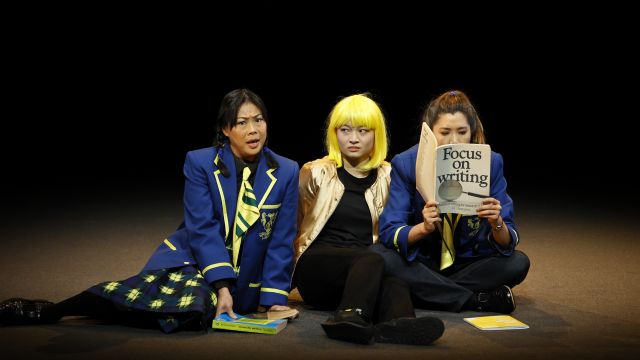Laurinda
Twenty years ago, working class, from a Vietnamese immigrant family Lucy (Ngoc Phan) got a scholarship to Laurinda, an exclusive (i.e., private, snooty, high fees) girls’ school. Now thirty-five, and still bearing the scars, she’s back at Laurinda to receive an award. Worse, it’s an award as a teacher and it is to be presented to her by her chief school days’ nemesis and tormentor, Brodie, who is now a judge. Lucy is having a panic attack. She’s hiding out in the loo.
There is only one way for Lucy to deal with that panic: go back and relive her time at Laurinda. And so, guided and advised by her spirit companion Linh (Gemma Chua-Tran), a sort of Jiminy Cricket character, back she goes to her horrible school days…
15-year-old Lucy’s time at Laurinda is a nightmare, mainly due to ‘The Cabinet’, three privileged, entitled, powerful white girls who bully, demean, patronise, undermine and gaslight Lucy (also Ngoc Phan as her younger self) who must grin and bear it, submit, ‘fit in’ or be destroyed.

It’s a sadly familiar story – familiar because it’s an essentially true phenomenon in state schools too and it happens over and over. The ‘popular’ and/or pretty girls, not particularly smart or sporty but with the money for grooming and better clothes, make up an exclusive coven who dominate all. Lesser beings must pay them tribute and keep their distance. Think of those movies Mean Girls or Heathers but here, at Laurinda, it’s with a distinctly Australian/Vietnamese take, with racism in the mix as well – plus class and money.
Is girl-on-girl bullying different to boy-on-boy bullying? More insidious? Crueller? More devastating? It looks that way. Usually no broken bones, bruises, or torn skin, but just as humiliating and destructive of self-esteem and even sanity. Of course, Lucy is not the only victim. There’s musician Trisha (Georgina Naidu) and nerdy-but-clumsy Katie (Fiona Choi) – obvious targets – but even a teacher, Dr Vanderwerp (Roy Phung), whom The Cabinet decides must be punished for lack of respect – or something. Smooth, soft-voiced Brodie (Gemma Chua-Tran) leads The Cabinet, with chilly, sneering Chelsea (Jenny Zhou) and enforcer Amber (Chi Nguyen); these girls can reduce anyone to impotent rage and helpless, speechless tears. Outside the school too, Lucy is patronised by white matrons as if it is just ah-maz-ing that a girl like her could be at Laurinda.
It is certainly a clever, subversive move to have all these nasty white girls and adults played by Vietnamese and Chinese actors – except for the delightful Georgina Naidu. Gemma Chua-Tran gives us two very different stand-out performances – as sprightly ball of energy Linh, Lucy’s soul and spirit guide, and the poisonous, unshakeably superior Brodie. Fiona Choi as try-hard Katie makes us laugh – and care for her. But then, so well do all these actors play their multiple roles, it is remarkable to realise at the end (and from the program) who played whom.

If Lucy’s situation at Laurinda – for her and the other outliers - seems possibly depressing – and the nastiness and arrogance of the entitled girls is chilling - playwrights Diane Nguyen and Petra Kalive find and sharpen the humour – satiric and otherwise - in Alice Pung’s (largely autobiographical) novel. This is especially so with the pragmatic, hard-headed character of Lucy’s sweatshop piece-worker Mum (Chi Nguyen). She, of course, wants a better life for her daughter – no matter what. So, stop complaining! Mum’s bursts of Vietnamese wisdom-of-experience realism, interspersed with English, get a lot of laughs from the Vietnamese-speaking audience as they recognise it’s what their Mum or Granma said too – and from English speakers too .
It is a problem, however, that Alice Pung’s novel is close to memoir, meaning that it is more a string of incidents – albeit well-observed – rather than a developing plot. The incidents build, yes, cumulatively to the climax, but there is a feel of ‘this happened and then that happened’. The sequences away from the school are a case in point. There’s a feeling of disengagement with story and character that is exacerbated by Eugyeene Teh’s set design. It’s a large blank stage, huge cyclorama at the back, with wide black columns that rise and descend. The columns are good for time travel, but otherwise feel overdone. Cast bring on and take off essential furniture. The rather monumental feel can leave the cast stranded in the space or lined up like crows on a fence. Were director and designer as one on this concept?

And it is strange, at least to me, that this small scale, intimate play, located almost all in the claustrophobic hothouse of a girls’ school, is mounted on the big Sumner Theatre stage when it could be so much more engaging in a more intimate theatre – especially for the young audience the production hopes to attract.
That said, the melodrama – because that’s what it is – can only end with a resolution of Lucy’s past and present and a moving affirmation of individuality and goodness. Laurinda gives us a funny, charming, slyly entertaining, and pointed show, with a cast who play their multiple roles so beautifully.
BUT THE SCRIPT FOR THIS PLAY AT BOOK NOOK.
Michael Brindley
Photographer: Jeff Busby
Subscribe to our E-Newsletter, buy our latest print edition or find a Performing Arts book at Book Nook.

